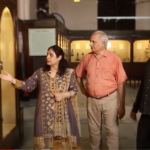Aligarh alum in New England pay tribute to Sir Syed Ahmed Khan with an Indo-Pak mushaira
Pakistanis and Indians from the greater Boston area flocked in large numbers to an event at a high school auditorium in Boylston town last week, brought together by their love for Urdu and poetry.
Celebrating Sir Syed Ahmed Khan’s 198th birthday anniversary, the Aligarh Alumni Association of New England (AAANE), organised a unique mushaira (poetry recital) with notable guests from India and Pakistan. They included Professor Sahar Ahsari, Sitare-e-Imtiaz recipient and former Chairman of the Urdu department, Karachi University, and Urdu poets from India like Tahir Faraz, Sunil Kumar Tang and Rajesh Reddy.
Dr. Syed Mohsin Alvi, President AAANE, in his welcome speech began the event “with hope for a lovely evening filled with intellectual exchange”.
Local poet Iqbal Danish who has had the honor of reciting his Kalam with Ahmed Faraz, Rahat Indori and Iftikhar Arif invited local poets to the podium, including Maarij Kirmani, Samina Khan and Fouqia Mushtaq.

India-Pakistan Urdu mushaira, Boston 2015: organised by Aligarh Alumni Association of New England (AAANE) in honour of Sir Syed Ahmed Kha. Photos: Syed Shujaat Ali
An attentive audience heard Samina Khan, an audiologist by profession, as she recited her verses.
“Tum agar Bhool bhi jao to Shikayat Kaisee
Tum ko Ehsaas nahi Mujhko Mohabbat Kaisee”
Another amateur poet, Fouqia Mushtaq, a doctorate candidate in Neuropharmacology, clearly takes after her father Syed Mushtaq Hussain, a renowned poet in Pakistan.
“Haqeeqat ko samajna chaatihooN – Nateeje per pahonchna chaati hoon
Mujhe Mauloom hai wo baat lekin – Tumhare MooN se sunna chaatihoon”.
A warm welcome awaited Maarij Kirmani whose family hails from Lucknow and brought the Urdu culture — Adaab-e-Lucknow — to Massachusetts.
“Mere Ashaar mein dhal ja khe KizaaN choo na sakay
Ta abd husn tera yuuHeen tarro taaza rahe
Aaj phir dil ka koee saaz ubhar aaya hai”.

Prof. Sahar Ahsari, Sitare-e-Imtiaz recipient and former Chairman of the Urdu department, Karachi University, with Tahir Ali
Iqbal Danish recited a nice couplet:
“Bigri hoouai hai soorat-e-ahwaal dehkna – Maazi ka aaj ho gya kya haal dekhna
Sab kuch chala gya hai zamane ke saath – Danish na jai haat se, Iqbal dekhna”
Sunil Kumar Tang evoked laughter with his witticisms and puns as he introduced the poets from India and Pakistan. They included Rajesh Reddy, born in Nagpur, who started his career as a Hindi journalist but delivers Urdu as if it is his first language. His recitation of couplets from his ghazals was well received:
“Yuun dekhiye to aandhi mein bas ik shajar gaya – Lekin na jaane kitne parindoN ka ghar gaya”
“Jitni baTni thi baT chuki ye zamin – ab to bas asman baaqi hai”
One verse particularly struck close to home: “Mere dil ke kisi kone mein ik masoom sa baccha – baDon ki dekh kar duniya baDa hone se Darta hai”
Toward the end, to resounding applause: “Hum zaroorat se bahut he kum pe raazi hogaye – Pyaas to darya ki thi shabnam pe raazi hogaye”
Sunil Kumar Tang already at the podium sharing his gift of the gab was rendered temporarily speechless Professor Sahar Ansari introduced him as the next poet. He is best known for his humorous poetry but the philosopher and the ambassador of peace comes through regardless. ”
Jo Hindustan ke peachay perhe hain vo Pakistan ke peachay perhe hain – aur Kabhie Shaytaan teh peachay hamare aur ab hum shaytaan ke Peachay perhe hain”
He jokingly added that hailing from Bihar he can borrow verses from other poets and call it his own, like the poet who recited Ghalib’s ghazal at a mushaira. When confronted, he retorted, “Kon Ghalib, aaj tak kissi mushaira to nahin dekha”.
With Nizamat back on his shoulders, Tang invited Tahir Faraz to the stage. Faraz belongs to Rampur district in UP and writes poetry in Urdu and Persian. kept the mood lively and interactive. When Tahir Faraz recites his poetry in melody, the voice as well as the verses are mesmerising.
“Nazar Se Bach Kar Guzartay Ho To Guzar Jiao – Main Aaeenaa Hoon Meri Apni Zimmedaari Hai”
Responding to a request from the audience, Faraz presented his signature work, “Maai”. He told me that Anand Raj Anand, the famous music director in Mumbai had asked him to write about Mother and “and deliver it with Tarranum”.
“Whenever I hear Maai, it brings tears to my eyes,” commented Mohammad Khalid, past AAANE executive member.
Inviting Prof. Sahar Ansari to the stage, Iqbal Danish described him with finesse:
“Ilm a Danish ka ik hisaab HaiN Aap – Chalti Phirti Huuyee Kitab heiN Aap – Gulshane-e-adab ki Zeenat heiN – Phool sab HaiN magar Gulaab HaiN Aap”
As Prof. Ansari went to the podium, audience members jumped to their feet, continuing the applause for some time. His verses were well received, as expected.
“Kissi bhi zakham pe asar na tha koyee – ye baat jab ki hai jab charahgar na tha koyee
Jisse Guzaar gaye hum baDe hunr ke saath – Vo zindagi thi hamaree, Hunr na tha koyee
Ajeeb hote HeiN Aadaab-e-Rukhsat-e-Mehfil – Keh uth ke vo bhi chala jisKa Ghar na tha koyee
Hajoom-e-Shehar meiN Shaamil raha aur iske baad – Sahar idhar bhi gya MaiN jidhar na tha koye”
In person, he is humble and down to earth, a true scholar with full command in Urdu. Considered to be an authority in Urdu and a viable critic, many poets seek his constructive criticism on their work.
As the event ended, the audience appeared to be thirsty for more. But, as the saying goes, all good things must come to an end.
“A well-balanced mushaira, well organized and it had everything, laughter, tears and seriousness,” commented Mohammad Khalid, past AAANE executive member.
Indian music and Urdu poetry lovers in the area can look forward to the forthcoming event announced by music enthusiast and writer Siraj Khan. Titled AAINA, the event is being organised in collaboration with AAANE in October to showcase the impact of Aligarh poets on Bollywood.
Tahir Ali is the Boston area-based author of “Muslim Vote Counts” (Wyndham Hall, 2004). Married with three children, he is from Pakistan. His parents hail from UP, India.














